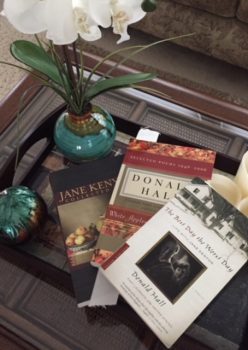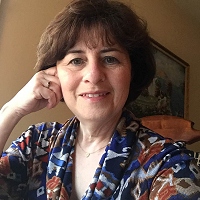
April is National Poetry Month, and although I’m not a poet myself, I have a deep appreciation for the way poets use syntax and imagery to examine their subject matter from a completely different vantage point than one would do in prose. Here in the Sunday Salon, I like to think about the intersection between life and art, and poetry seems to be one of the finest examples.
 This month I returned to the poetry of Jane Kenyon and Donald Hall, two poets who happen to be married to one another and who, for me at least, really embody this intersection of life and art. I return to Hall’s memoir, The Best Day the Worst Day, his memoir about life with Kenyon and her death from leukemia at age 47. I return to Kenyon’s book of collected essays, A Hundred White Daffodils, where she often writes about life in the small New Hampshire town where she and Hall moved in the late 1970’s. I return to Bill Moyers Emmy winning documentary about the couple, A Life Together.
This month I returned to the poetry of Jane Kenyon and Donald Hall, two poets who happen to be married to one another and who, for me at least, really embody this intersection of life and art. I return to Hall’s memoir, The Best Day the Worst Day, his memoir about life with Kenyon and her death from leukemia at age 47. I return to Kenyon’s book of collected essays, A Hundred White Daffodils, where she often writes about life in the small New Hampshire town where she and Hall moved in the late 1970’s. I return to Bill Moyers Emmy winning documentary about the couple, A Life Together.
In short, I immerse myself in the lives of these poets. I become something of a poetry nerd, searching out poems that reflect life events both large and small.
I’m not disappointed. Early in their marriage, Kenyon writes of moving into Hall’s boyhood home.
You always belonged here.
You were theirs, certain as a rock.
I’m the one who worries if I fit in with the furniture
and the landscape.
Hall writes so often of their daily routine it becomes sacred in it’s assuring sameness.
In the bliss of routine
-coffee, love, pond afternoons, poems –
we feel we will live
forever, until we know we feel it.
When illness strikes one and then the other, they work out their reactions and experiences in poem after poem, reminding us of the way life can upend itself, rearrange itself, and come to rest as something completely changed. One of Kenyon’s most well known poems, Otherwise, describes this uncertainty with such grace.
I got out of bed
on two strong legs.
It might have been
otherwise. I ate
cereal, sweet
milk, ripe, flawless
peach. It might have been otherwise.
I took the dog uphill
to the birch wood.
All morning I did
the work I love.
***
At noon I lay down
with my mate. It might
have been otherwise.
We ate dinner together
at a table with silver
candlesticks. It might
have been otherwise.
I slept in a bed
in a room with paintings
on the walls, and
planned another day
just like this day.
But one day, I know,
it will be otherwise.
In Her Long Illness, Hall describes the days of vigil at Kenyon’s bedside, a feeling familiar to anyone who has nursed a loved one.
Daybreak until nightfall.
he sat by his wife at the hospital
while chemotherapy dripped
through the catheter into her heart.
He drank coffee and read
the Globe. He paced; he worked
on poems; he rubbed her back
and read aloud. Overcome with dread,
they wept and affirmed
their love for each other, witlessly,
over and over again.
Hall writes that “Poetry embodies the complexity of feelings at their most entangled.” It offers us company in joy and sorrow, invites us to examine emotions, nature, all of life in a unique way. Poetry parses the stuff of life and untangles the snares of emotions that trap us in grief, loneliness, or confusion. It glorifies the particular beauty in nature and living things and reminds us of their value. In a few carefully selected and crafted phrases, a poet creates a new way of seeing, and also reaches a hand to the reader, inviting them to meet at this juncture of art and life.
Just because I don’t write poetry doesn’t mean I can’t look at life with a poet’s eye. Reading and studying the lives of the poets, observing the way they view their experiences through that unique poetic lens encourages me to do the same. Poets lift up the smallest details to a level of near holiness, something we might all benefit from doing. If, as the saying goes, life is in the details, the poet can teach us to examine the particular details of our own lives, appreciate and even exalt them in ways that can change us forever.
About the Author: Becca Rowan
 Becca Rowan lives in Northville, Michigan with her husband. She is the author of Life in General, and Life Goes On, collections of personal and inspirational essays about the ways women navigate the passage into midlife. She is also a musician, and performs as a pianist and as a member of Classical Bells, a professional handbell ensemble. If she’s not writing or playing music you’ll likely find her out walking or curled up on the couch reading with a cup of coffee (or glass of wine) close at hand. She loves to connect with readers at her blog, or on Facebook, Twitter, or Goodreads.
Becca Rowan lives in Northville, Michigan with her husband. She is the author of Life in General, and Life Goes On, collections of personal and inspirational essays about the ways women navigate the passage into midlife. She is also a musician, and performs as a pianist and as a member of Classical Bells, a professional handbell ensemble. If she’s not writing or playing music you’ll likely find her out walking or curled up on the couch reading with a cup of coffee (or glass of wine) close at hand. She loves to connect with readers at her blog, or on Facebook, Twitter, or Goodreads.
